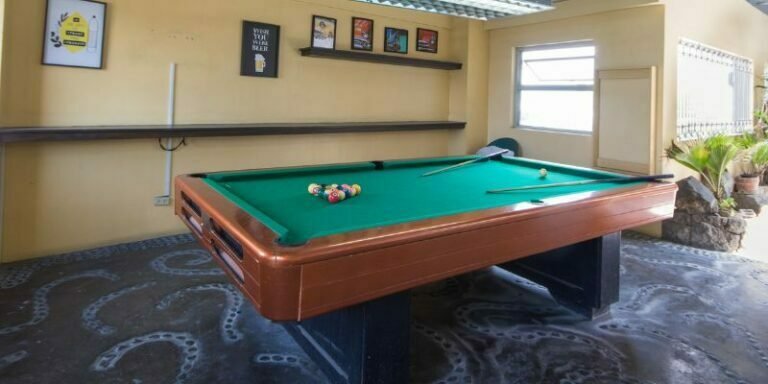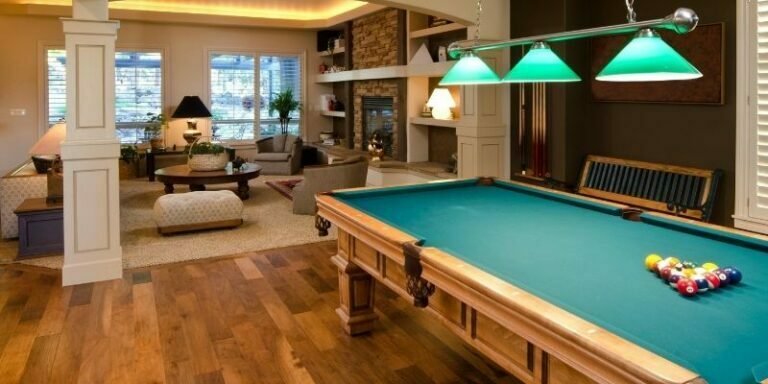Will Rain Water Ruin My Pool Table? Managing it Outside

Pool tables, with their substantial size and weight, are surprisingly delicate pieces of furniture.
Their vulnerability to elements, especially water, is often underestimated, which leads us as players to an important question: Will rain water ruin my pool table?
There are many caveats to the answer, which I will answer within this article.
Key Takeaways
- Rain water can significantly damage both the wood and felt of a pool table.
- The type of material (wood, MDF, slate) influences the degree of damage.
- Immediate and proper care can mitigate water damage.
- Outdoor pool tables are designed to withstand weather elements, making them a durable choice for outdoor entertainment.
The Quick Answer
The short answer is yes, rain water can damage your pool table, but the extent of the damage depends on various factors, including the amount of moisture exposure.
| Material | Properties | Vulnerability to Water |
|---|---|---|
| Wood | Porous, common in pool tables | High, prone to warping |
| MDF | Budget-friendly, machine-pressed wood | Very high, warps easily |
| Slate | Non-porous rock, durable | Low, but backing material matters |
Are Pool Tables Waterproof?
Most traditional pool tables are made of wood, which is not inherently waterproof.
As wood is a porous material so it will also absorb water, and exposure to moisture can cause warping, swelling, and damage to the wood
Slate, a common material for the bed of high-quality pool tables, is naturally water-resistant, however, the felt covering the slate is susceptible to water damage.
The playing surface, often called felt, is actually a cloth, made from wool and nylon.
When the cloth absorbs water, it compromises the integrity of the cloth, which changes the way balls behave and affects the gameplay.
Will Rain Water Ruin My Pool Table?
- Rain water can leave stains in the felt, create added friction, while also accelerating wear and tear on the cloth.
- Budget-friendly MDF pool tables are popular for casual home use, however are particularly prone to warping when exposed to moisture.
- Slate, a popular pool table material, is impervious to water, however, the wood (MDF) backing often used with slate can absorb moisture, potentially causing misalignment.
Can You Weatherproof a Pool Table?
Yes, you can weatherproof a pool table to some extent, especially if you intend to use it in an outdoor setting or in an area where it might be exposed to moisture.
Protective Covers are a mainstay in most serious players’ equipment, and they are one of the most cost-effective, yet simplest solutions to increase your table’s resistance to water damage when it’s not being used.
- Use a high-quality, waterproof cover to protect the pool table when not in use.
- This is beneficial for outdoor tables, but also very important for indoor tables kept in humid environments.
Can the Slate on a Pool Table Warp?
Slate is a fine-grained, foliated, homogeneous metamorphic rock derived from an original shale-type sedimentary rock.
Slate is resistant to warping, which is one of its key characteristics and is known for its durability and resistance to weathering, making it an ideal material for pool tables.
This resistance makes it a preferred choice for pool tables, as it maintains a level and true playing surface.
Misconceptions About Slate Warping
It’s important to understand that what is often referred to as “warping” in pool table slate is actually sagging.
This sagging can occur in the middle or at the sides of the slate and is caused by factors other than the slate itself.
Causes of Slate Sagging
- Table Construction and Support: The weight of the slate requires a strong and stable support system. Inadequate support can lead to sagging over time.
- Quality of Pool Table: Higher quality tables, built with better materials, are less likely to encounter slate sag.
- Thickness of the Slate: Thicker slates are less prone to sagging. Standard thicknesses include 1″, 3/4″, and 1/2″.
- Type of Slate Pool Table: Home slate pool tables usually use three-piece slate, which is less prone to sagging compared to one-piece slate due to the weight distribution.
- The Wood Backing: Slate is usually backed by MDF, which can warp and push the slate out of alignment, which is often confused with the slate itself warping.
Does a Pool Table Need to Be Climate Controlled?
The short answer is yes, climate control is essential for maintaining the quality and longevity of a pool table.
In particular, the humidity and temperatures need to be managed effectively for the benefit of longevity.
| Condition | Optimal Condition | Effect on Pool Table |
|---|---|---|
| Humidity | 40-60% | Prevents warping and cracking |
| Temperature | Consistent and moderate | Maintains wood and cloth integrity |
Will Cold Weather Hurt a Pool Table?
Cold weather can have a profound impact on pool tables, affecting various components and the overall playability of the game.
- The felt covering the table can tighten or loosen in response to temperature changes, affecting the speed and smoothness of play.
- The playing cloth can absorb moisture from the air in cold, humid conditions, leading to a slower, less consistent ball roll.
- The rubber cushions can harden in cold weather, reducing their elasticity and impacting the bounce and speed of the balls.
- High humidity levels, can cause the wooden parts of the pool table, such as the frame and legs, to swell and warp.
- Low humidity can cause the wood to dry out, crack and cause splitting.
Will a Pool Table Warp in a Garage?
In a garage, where insulation and climate control are often lacking, a pool table can be exposed to extreme conditions that lead to warping.
They can become very hot in the summer and cold in the winter, with humidity levels that can vary significantly.
If you decide to place your pool table in the garage, consider implementing climate control solutions.
Managing the Climate Around Your Pool Table
Keeping your pool table in a climate-controlled room ensures a consistent environment, safeguarding against extreme temperature and humidity fluctuations.
- To combat humidity issues, using a dehumidifier in damp conditions or a humidifier in dry conditions can help maintain the ideal humidity level, typically between 40% and 60%.
- For pool halls and commercial settings, investing in a central HVAC system with precise humidity and temperature control is advisable.
- Regularly inspecting and adjusting the table for levelness and tension in the felt can help maintain its condition.
- Placing silica gel packets or moisture absorbers around your pool table can help maintain a dry environment.
Can You Keep a Pool Table in a Covered Patio?
Yes, you can keep a pool table in a covered patio, however, considering the effect of temperature and humidity it’s not as straightforward as placing any pool table outside.
The conditions outside vary significantly from controlled indoor environments and can experience huge swings from one day to the next, depending on your location.
Such extreme changes in the elements, are not good for a table, whether covered or not, especially if you are bringing your indoor pool table outside.
Are Outdoor Pool Tables Any Good?
Outdoor pool tables are specifically designed to endure the harsh conditions of outdoor environments.
Unlike indoor pool tables, they are made with weather-resistant materials such as aluminum, outdoor playing, and waterproof finishes.
This ensures that an outdoor table remains unaffected by weather changes, including rain, sun, and humidity.
What Are Outdoor Pool Tables Made Of?
Outdoor pool tables are made to withstand various weather conditions.
An outdoor pool table is typically built using:
- Stainless Steel or Aluminum, which is rust resistant for the frame
- A thicker, more durable playing cloth that is water-resistant and UV protected. Popular outdoor pool table felt materials are Sunbrella, Polytech or Taclon.
- Most outdoor pool tables use slate, however budget friendly manufacturers also use pearl board as a cost-effective alternative.
- High quality Phenolic Resin billiard balls can be used both on indoor and outdoor pool tables. For best proection of your balls, store them inside when not being used.
- Most outdoor pool tables come with standard metal cues, however you can also use your indoor cues outside, just store them indoors with climate control.
- Rubber with K66 or K55 profiles are used for both indoor and outdoor pool table cushions, as they generally hold up well to the elements for many years.
Benefits of Owning an Outdoor Pool Table
- Versatility and Fun: They provide a great way to entertain guests and enjoy the outdoors.
- Durability: Made with weather-resistant materials, they are built to last in the elements.
- Aesthetic Appeal: They can be a stylish addition to patios, gardens, or poolside areas.
- Sun Protection: The thicker playing cloth are UV-resistant for protection against fading
Can A Deck Hold A Pool Table?
Installing a pool table on a deck can be a fantastic way to enjoy outdoor entertainment, but it raises several important considerations, such as the deck strength to hold the weight.
Pool tables are substantial pieces of furniture, with weights ranging from 500 to 1,200 pounds or more.
Assessing Deck Strength
It’s hard to give a definitive answer as to how much weight your deck can hold, because different factors come into play, such as:
- The quality of the construction
- The foundations
- The type of materials used
You also need to bear in mind that the weight-bearing capacity of the deck takes into account both the live load and dead load, which are not in equal proportion.
Consulting with a structural engineer or a decking professional is advisable to ensure safety.
However, in general, most decks are built to hold up to 50 pounds per square foot
- The heaviest home pool tables usually weigh no more than 1200 pounds.
- A pool table’s weight is evenly distributed across all its legs, and most should sit comfortably within 50 pounds per square foot.
It’s also not just the table’s weight you need to consider, but also the weight of people, furniture and features like fire pits and outdoor bars etc.
References
https://www.robbiesbilliards.com/blogs/news/11947737-how-to-fix-a-wet-pool-table
https://cuesup.com/faqs/how-to-clean-a-pool-table/
https://lngcs.com/blog/2018/3/6/case-study-water-damaged-pool-table-top-4wpf5






